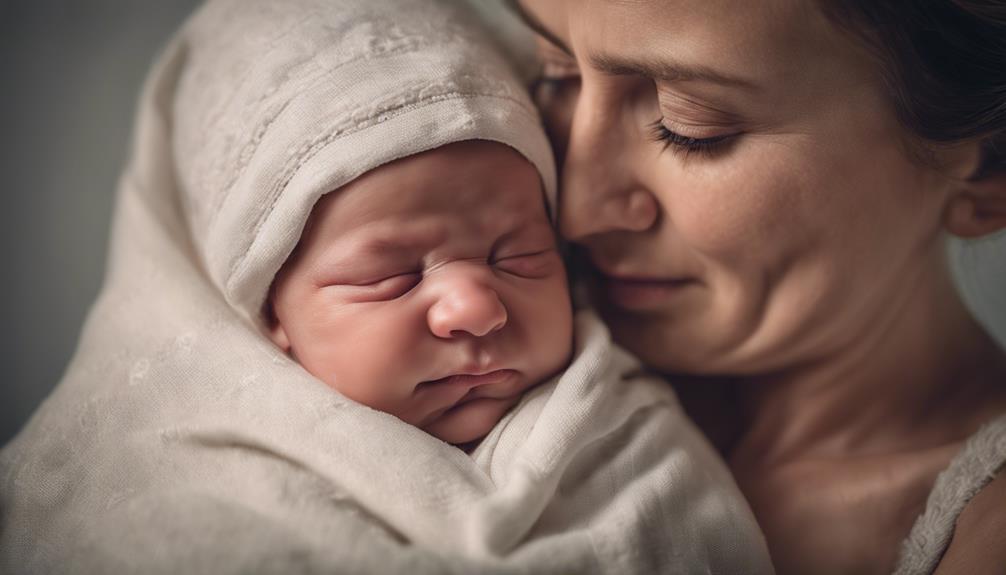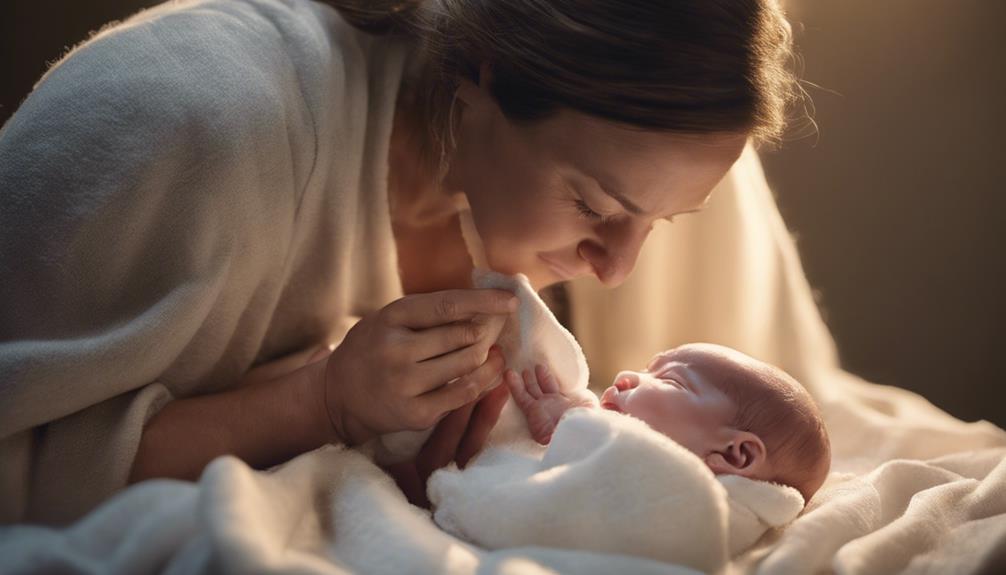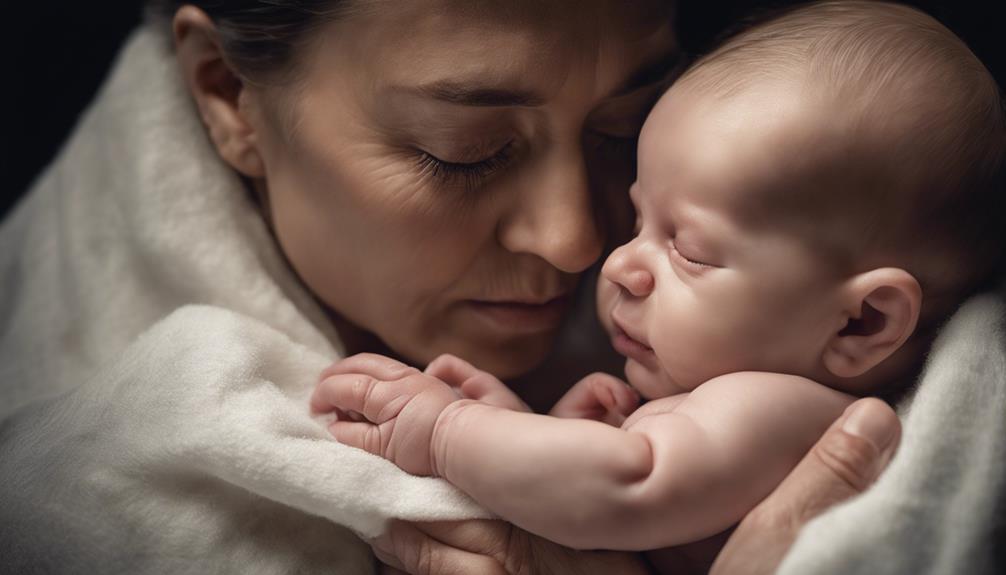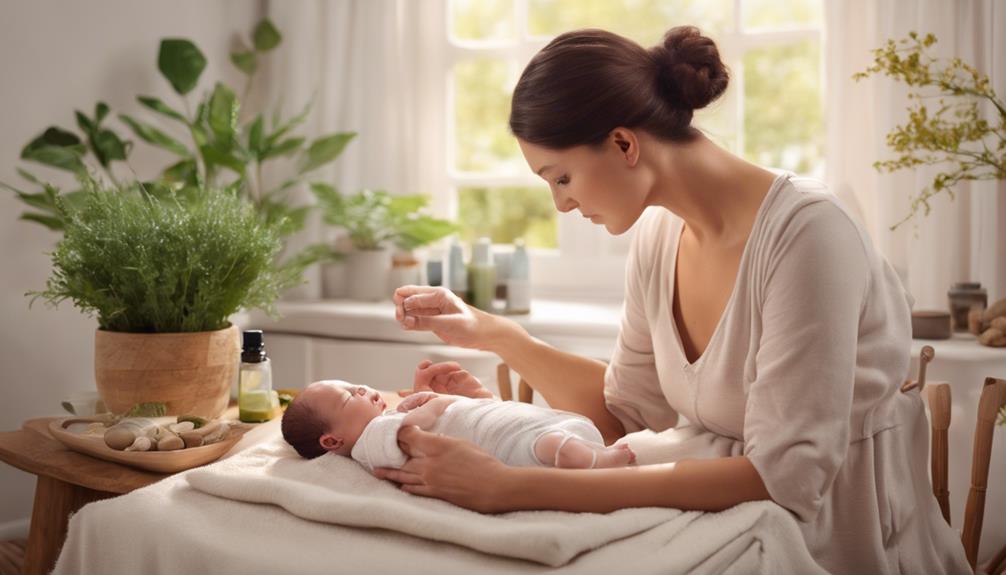As we carefully cleaned the eyes of our newborn with a sterile cloth, thoughts about whether we were adequately ensuring the health of their eyes crossed our minds. It’s crucial to keep up with proper eye care for newborns, and parents must know the key advice to preserve their child’s eyesight.
From hygiene practices to recognizing potential issues early on, understanding the importance of newborn eye care is paramount in promoting lifelong eye health. But what are the specific measures that parents need to take to protect their baby's precious eyes?
Key Takeaways
- Maintain hygiene by washing hands and using sterile objects for baby's eye care.
- Recognize signs of eye issues like redness, swelling, or excessive tearing promptly.
- Practice preventive measures such as gentle cleaning and protection from irritants.
- Consult a healthcare professional for any concerning eye problems to ensure proper care and development.

Baby Grooming Kit, Infant Safety Care Set with Hair Brush Comb Nail Clipper Nasal Aspirator,Baby Essentials Kit for Newborn Girls Boys (Blue)
14 in 1 Baby Grooming Kit: The package comes with the baby grooming kit, including baby nail file,…
As an affiliate, we earn on qualifying purchases.
As an affiliate, we earn on qualifying purchases.
Importance of Newborn Eye Care
Understanding the significance of caring for a newborn's eyes is important for ensuring their long-term health and development. Newborn babies enter the world with delicate eyes that are still developing. Proper eye care from the beginning plays a critical role in preventing infections and supporting healthy eye growth.
As a baby's vision gradually improves, their eyes need gentle attention to aid this progress. Initially, babies can focus on objects within a range of 8 to 12 inches, and as their eye muscles strengthen, their ability to see clearly enhances. By establishing good eye care practices early on, we lay a solid foundation for the future eye health of our little ones.
It's heartwarming to witness the wonder in a baby's eyes as they start to explore the world visually. Taking care of their precious eyes isn't just about the present but also about safeguarding their sight for the years ahead.

NOVEHA 60PCs Baby Eye Wipes | Safe & Natural Eyelid & Lash Wipes | Non Irritating, Tear Free, Hypoallergenic & Preservative free | Organic Baby Wipes for Sensitive Skin | Soothing and Moisturizing
🛡️ ULTIMATE CARE: Soothe, moisten, and clean your baby’s sensitive eyelids and eyelashes and clogged tear ducts without…
As an affiliate, we earn on qualifying purchases.
As an affiliate, we earn on qualifying purchases.
Hygiene Practices for Baby's Eyes

When caring for a baby's eyes, it's essential to maintain proper hygiene practices to safeguard their delicate eye area and prevent infections. Babies are born with sensitive eyes that require gentle care. Before cleaning the eyes, make sure your hands are thoroughly washed with water and neutral soap to prevent any contamination.
Use a sterile object such as sterilized wet wipes or gauze to wipe the eyes, avoiding direct contact with your hands or cotton. It's important to moisturize the eyes before separating the eyelids to prevent dryness and discomfort. When cleaning, use physiological serum or warm boiled water to moisten the gauze for a gentle wipe. Harsh products should be avoided as they can irritate the baby's eyes.

OCuSOFT Baby Eyelid and Eyelash Cleanser, Pre-Moistened Towelette, White/Blue 20 Count
Mild, tear-less formula, soothes away irritation.
As an affiliate, we earn on qualifying purchases.
As an affiliate, we earn on qualifying purchases.
Recognizing Signs of Eye Issues
To ensure the well-being of your baby's eyes, it's important to be vigilant for any signs of eye issues such as redness, swelling, discharge, or crust, which could indicate conditions like conjunctivitis. Additionally, excessive tearing may suggest a blocked tear duct or infection, requiring prompt medical attention. If you notice your baby rubbing their eyes frequently, it could signify discomfort or an underlying eye problem that needs evaluation.
Keep an eye out for crossed eyes or misalignment, which should be closely monitored, with consultation from a doctor if it persists. Sensitivity to light, squinting, or closing eyes in bright light may also be indicators of an eye issue that necessitates assessment by a healthcare provider.
Regularly checking for these signs and seeking professional advice when needed is essential for maintaining your baby's eye health and ensuring their proper visual development. Remember to always handle your baby's delicate eyes with care, gently wiping away any discharge to prevent eye infections and promote overall eye wellness.

PhysiciansCare by First Aid Only 7-006 Eye Wash Solution, 4 oz Bottle
Eye Flushing Solution for Irrigating the EPortable.
As an affiliate, we earn on qualifying purchases.
As an affiliate, we earn on qualifying purchases.
Preventive Measures for Eye Health

One effective way to safeguard your newborn's eye health is by regularly cleaning their eyes with a clean damp cloth to prevent infections and maintain hygiene.
When it comes to preventive measures for eye health, there are several essential steps you can take to protect your baby's vision:
- Avoid using harsh products: Opt for gentle cleaning methods such as using a clean damp cloth or a cotton ball moistened with breast milk to wipe away any discharge or debris around the eyes. Harsh chemicals can irritate the delicate skin around the eyes and potentially harm your baby's vision.
- Protect your baby's eyes from irritants: Be cautious about what comes in contact with your baby's face, including toys. Regularly clean toys that your baby interacts with to prevent the spread of germs that could lead to eye infections.
- Monitor for signs of infection: Keep an eye out for any redness, discharge, swelling, or abnormal eye movements. Early detection of these signs can help in timely intervention and maintaining your baby's eye health.
Consulting a Doctor for Eye Concerns
To guarantee excellent eye health for your newborn, promptly seek guidance from a pediatrician or ophthalmologist regarding any concerning eye issues. Consulting a healthcare professional for any signs of eye problems in your baby is important for their well-being. Timely intervention can prevent complications and ensure proper eye development.
Regular check-ups with these specialists during the early months of your baby's life are essential. Addressing any potential eye issues promptly is key to avoiding long-term consequences that may affect your baby's vision.
Seeking medical help for any newborn eye concerns is a proactive step towards ensuring ideal eye health and development. Remember, your pediatrician or ophthalmologist is there to support you and your baby, providing expert advice and guidance every step of the way. Trust their expertise and don't hesitate to reach out whenever you have any concerns about your newborn's eyes.
Frequently Asked Questions
What Do You Need to Know About a Newborn's Eyes?
We acknowledge the significance of newborn eye care. Their developing vision necessitates gentle handling. Clean hands and using plain water for wiping eyes is essential. Trimming nails prevents accidental scratches. These practices guarantee healthy eyes for our little ones.
How Do You Take Care of Newborn Eyes?
Taking care of newborn eyes involves gentle cleaning with a damp cloth and vigilance for signs of infection. We avoid touching their delicate eyes and promptly seek help if there are any concerns. Prioritize your baby's eye health for a bright future!
What Are the 4 Essentials of Newborn Care?
When caring for newborns, essentials include keeping hands clean, avoiding harsh products, trimming nails, supporting the baby's head, and protecting eyes from sunlight. It's essential to prioritize these practices to guarantee the baby's well-being.
How Can I Make Sure My Baby Has Good Eyesight?
We guarantee our baby's good eyesight by providing visual stimulation with high-contrast objects and faces close by. We position our baby to view preferred patterns for engagement. We support preemie eyesight naturally and monitor milestones.
Conclusion
As we journey through the delicate world of newborn eye care, let's be the vigilant guardians of our little one's windows to the soul.
Just as we tend to a blossoming garden, let's nurture and protect their precious eyes with the utmost care and devotion.
Remember, in the tapestry of life, our baby's eyes are the threads that weave a beautiful story of love, growth, and boundless possibilities.
Let's cherish and safeguard this gift of sight with unwavering commitment.









